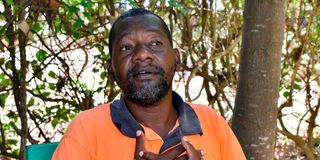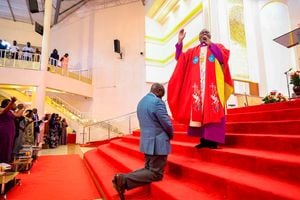Mackenzie saga and philosophy of law

Paul Mackenzie of the Good News International Church during an interview with the ‘Nation’ in Kilifi County on March 24, 2023.
In the ongoing ‘Pastor’ Paul Mackenzie saga, I think the police are blameless. Mackenzie has been arrested several times and set free by the courts.
The Judiciary has confirmed this, but there is every likelihood the Judiciary will justify those releases on the basis of ‘poor cases were presented by prosecution’. But, is it really the case of poor presentation of evidence by the prosecution or poor investigation?
Definitely, the constant acquittal of ‘Pastor’ Mackenzie does raise some serious questions on judicial powers. Barring possibilities of corruption, what can make a judge or magistrate set free a person like Mackenzie or other seemingly immoral characters in the ‘public eye’?
Why is it that judges and magistrates often render judgments that seem to offend basic human conscience? Why is it that some judges and magistrates render judgments that are at variance with public mood?
To attempt to answer these complex questions, an introduction to legal philosophy by way of retelling of a true story may be important.
Between 1939 and 1945, the world was immersed in World War II and millions of people died and property was destroyed. The two main groupings of nations involved in the war were the Allies and the Axis.
The Allies consisted of America, UK, France and Russia. The axis included Japan, Germany and Italy. Germany, led by Hitler and his Nazi party, decided to kill Jews. An estimated six million Jews died in genocide (holocaust) in various concentration camps. However, the Germans lost the war and Hitler killed himself.
One of Hitler’s henchmen was a man called Otto Adolf Eichman, who was an official of the Nazi party and one of the major organisers of the Holocaust.
He participated in the January 1942 Wannsee Conference, at which the implementation of the genocidal Final Solution to the Jewish Question was planned. Following this conference, he was tasked by SS-Obergruppenführer Reinhard Heydrich with facilitating and managing the logistics involved in the mass deportation of millions of Jews to Nazi ghettos and extermination camps across German-occupied Europe.
He was captured and detained by the Allies in 1945, but escaped and eventually settled in Argentina, where he disguised himself as an ordinary person. He went to Argentina on purpose — the country did not have an extradition treaty with Israel, hence legally he could not be repatriated to face trial.
However, in May 1960, he was abducted illegally by Mossad, the national intelligence agency of Israel. Eichmann subsequently stood trial with the Supreme Court of Israel.
In court, he was asked if he participated in the killing of Jews. He enthusiastically confirmed how he killed poor, defenceless women and children without mercy. However, he said he had four important defences.
“Which ones ?” the court inquired.
First, he argued that he had been brought to court in violation of the law. Argentina did not have an extradition treaty with Israel, hence this trial was null and void ab initio (from the beginning). Second, the purported crimes happened in Germany. Therefore, he should stand trial in Germany, not Israel. In any event, in 1940-45 when these crimes allegedly happened, the state of Israel was not in existence.
Third, in Germany where these alleged offences took place and at that time, there was no crime known as ‘genocide’. Therefore, he argued, he was being charged with a crime that was not known in law. Finally, he argued, a law/policy to kill Jews had been passed by the body that had the legal competency to pass laws in Germany. Hence, he was only obeying lawful orders.
The court was in a dilemma.
Positivist view of law
On the one hand, if the court found him guilty, it would clearly be overturning basic legal tenets as ably canvassed by Adolf’s counsels. But, if on the other hand, it set him free, millions of Jewish families would not get justice. If the court was minded to agree with Adolf, it would be taking what is called a “positivist” view of the law. If it found him guilty, it would be taking a ‘natural” view of the law.
Legal positivism includes the contentions that laws are mere commands of human beings with threats of force. It holds that law is valid notwithstanding it merits or demerits. In other words, law and morality are distinct. In a nutshell, positivists hold the view that it is not the business of lawyers and judges to say whether a law is good or bad . The business of rendering such moral verdicts is best left to parliamentarians, philosophers and the public. The work of lawyers and judges, this school of thought holds, is to apply the law ‘as it is’.
Natural lawyers hold the contrary view that law and morality cannot be divorced; that the law is based on basic human values that are universal and standard. It is based on values intrinsic to human nature that can be deduced and applied independently of man-made law (the express enacted laws of a state). Such values include the universal need to preserve human life. For example, even in states where the law ‘not to commit genocide’ might be missing, citizens of such a country ought not to kill since it is against human nature to do so.
Therefore, for a positivist-minded judge, both Adolf and ‘Pastor’ Mackenzie can be acquitted if the strict application of law favours them. For a natural law-minded court, both would be found guilty once certain facts that point towards the commission of acts that offend basic human conscience regardless of legal technicalities are established.
Therefore, to boost the chances of his conviction, Kenyans should pray and hope ‘Pastor’ Mackenzie is arraigned before a natural law-oriented court. Otherwise, a small technicality can lead to his acquittal if the case is before a ‘positivist-minded’ court. My pupil master was a renowned criminal lawyer. He once came to our chambers complaining about a case where he was defending a murder suspect who had a very high chance of losing.
“The prosecution witnesses are so strong. Cross-examination is not denting them,” he lamented.
He, nevertheless, ultimately won on a very small technicality. Under evidence law at the time, one could only prove death by production before the court of a death certificate by the maker — the doctor who signed it off. The death certificate was physically before the court (even the judge could see it).
But the doctor who had signed it off was running late and hence the prosecution case was closed before the official presentation of the evidence. The judge agreed there was overwhelming evidence of murder but stated that she did not ‘officially’ receive a death certificate, hence there was no proof of death.
The downside of the above is that judges and magistrates never declare their philosophical leanings when deciding cases. One can only decipher their philosophical leanings by scrutinising their judgment record.
For your information, Adolf Eichman was found guilty.
Dr Kang’ata is the Governor of Murang’a County.





